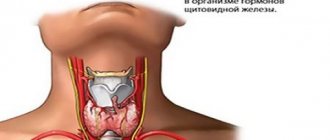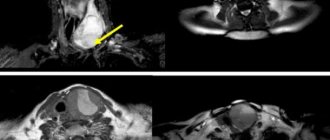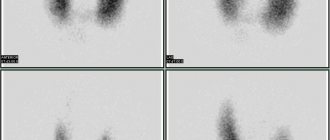Antibodies are complex compounds that contain carbohydrate and protein (produced by the immune system to detect and destroy pathogenic bacteria and microorganisms). It is worth noting that autoantibodies instantly react to even minimal deviations from the norm in the body: they can begin to perceive healthy cells as dangerous, therefore, actively destroying them.
It is for this reason that an analysis for antibodies to thyroid peroxidase (the enzyme through which the thyroid gland synthesizes iodine-containing hormones) allows one to determine the presence of the disease even when they, in fact, have not yet manifested themselves.
Problems with the thyroid gland and disturbances in the levels of the hormones T4, T3, and TSH can cause serious consequences, such as thyrotoxic crisis, hypothyroid coma, and even death. Endocrinologists unanimously say that problems with the thyroid gland are easy to solve if they are diagnosed in a timely manner.
Detailed description of the study
Thyroid peroxidase is a glycoprotein enzyme found in the epithelial cells of the thyroid follicles. It carries out the oxidation of iodides to “active” iodine and iodination of tyrosine, subsequently the precursors of thyroid hormones are formed (T4 predominates). Determination of the level of autoantibodies to thyroid peroxidase is used as a marker of autoimmune diseases of the thyroid gland, as an indicator of the risk of developing postpartum thyroiditis. Thyroid function decreases mainly due to decreased T4 secretion.
Antibodies to thyroid peroxidase are specific immunoglobulins directed against the enzyme contained in the cells of the thyroid gland and responsible for the formation of the active form of iodine for the synthesis of thyroid hormones. They are a specific marker of autoimmune thyroid diseases. The thyroid enzyme thyroid peroxidase plays a key role in the formation of thyroid hormones. Thyroid peroxidase is involved in the formation of the active form of iodine, without which the biochemical synthesis of thyroid hormones T4 and T3 is impossible. The appearance of antibodies to this enzyme in the blood disrupts its normal function, resulting in a decrease in the production of the corresponding hormones. Hypothyroidism manifests itself in the form of symptoms such as weight gain, goiter, dry skin, hair loss, constipation, and increased sensitivity to cold. Hyperthyroidism is accompanied by sweating, rapid heartbeat, anxiety, tremors in the limbs, weakness, sleep disturbances, weight loss, and exophthalmos. Thyroid peroxidase antibodies are the most sensitive test for detecting autoimmune thyroid disease. Usually their appearance is the first shift that is observed in the course of developing hypothyroidism due to Hashimoto's thyroiditis. Detection of AT-TPO during pregnancy indicates the risk of developing postpartum thyroiditis in the mother and a possible impact on the development of the child.
Reasons for the appearance of antibodies to thyroid peroxidase
Content:
- Reasons for the appearance of antibodies to thyroid peroxidase
- Characteristic indicators of the presence of excess hormone levels
- Antibody test algorithm
Thyroid peroxidase is a special enzyme of the thyroid gland.
It helps accelerate the process of iodination of tyrosine residues of the thyroglobulin protein, and also activates the fusion of iodotyrosines, known as T4 and T3.
For one reason or another, the body may begin to consider this enzyme as foreign, therefore, antibodies to thyroid peroxidase begin to be produced to destroy the enzyme.
There are a number of reasons that can influence the immune system to begin the active process of producing antibodies to thyroid peroxidase: autoimmune diseases, diseases and injuries of the thyroid gland, genetics, chronic illnesses, sinusitis, anemia, diabetes, iodine overdose or deficiency, previous illnesses of viral etiology, intoxication, radiation.
A frequent increase in the number of antibodies to thyroid peroxidase is observed in women during pregnancy. This phenomenon occurs due to the restructuring of the hormonal and immune systems in order to effectively bear the baby.

During pregnancy, a woman’s thyroid gland begins to work in a special way, since it is obliged to enrich not only her body with the necessary amount of vital elements, but also the body of the developing fetus. Among the main and common causes of increased AT to thyroid peroxidase, the following number of factors are worth noting:
- various pathologies of the endocrine system and thyroid gland;
- systemic lupus erythematosus;
- rheumatism;
- pernicious anemia.
If the cause of the imbalance in enzyme levels is pregnancy, the number of antibodies will return to normal on their own eight months after birth.
Characteristic indicators of the presence of excess hormone levels
If the amount of antibodies to thyroid peroxidase is in excess, the development of a disease such as hypothyroidism is possible. Hypothyroidism is a condition where the concentration of thyroid hormones decreases. This pathology often manifests itself together with the inflammatory process of the thyroid gland and diffuse toxic goiter. Thyroid hormones actively take part in the process of development and growth of the body, therefore, their insufficient or excessive production can provoke the development of various negative consequences.
It is very difficult to diagnose thyroid diseases at an early stage, since they do not have obvious symptoms. At the initial stage, an elevated ATPO level may be characterized by the following symptoms:
- swelling of the legs;
- development of hypotension;
- slight decrease in body temperature;
- dry skin;
- causeless feeling of anxiety;
- hair loss;
- apathy.
There may also be malfunctions in the reproductive, cardiovascular, nervous, digestive and musculoskeletal systems. The size of the thyroid gland increases in order to provide the maximum dosage of hormones required by the body.
An enlarged thyroid gland can cause discomfort in the form of difficulty swallowing, hoarseness when speaking, and pain.
An increase in antibodies may indicate the presence of Graves' disease, thyroid cancer, thyroiditis, hypothyroidism, diffuse toxic goiter. If it is not changed, other indirect factors can also cause a disruption in the process of antibody production: glomerulonephritis, anemia, rheumatoid arthritis, insulin-dependent diabetes, autoimmune gastritis, insufficient amounts of hormones produced by the adrenal glands, scleroderma.
Best materials of the month
- Coronaviruses: SARS-CoV-2 (COVID-19)
- Antibiotics for the prevention and treatment of COVID-19: how effective are they?
- The most common "office" diseases
- Does vodka kill coronavirus?
- How to stay alive on our roads?
If a woman has antibodies to thyroid peroxidase during pregnancy, a blood test is required for the child.
Who and when prescribes a test for antibodies to thyroid peroxidase?
A referral for a study is issued by a general practitioner, pediatrician, family doctor, endocrinologist, gynecologist, cardiologist, surgeon and other specialists. The anti-TPO test is intended for diagnosing thyroid diseases:
- autoimmune and postpartum thyroiditis;
- diffuse toxic goiter;
- hyperthyroidism and hypothyroidism.
Conduct a blood test for the presence of antibodies in adults, children and newborns. Infants are given testing if the mother is diagnosed with a thyroid disorder. The analysis allows you to establish or exclude the presence of thyroid diseases of an autoimmune nature. A signal to visit the laboratory are symptoms such as enlarged glands, increased fatigue, cramps, brittle nails, dry hair.
The analysis is carried out one-time if the above diseases are suspected and on a regular basis:
- when monitoring the effectiveness of therapy;
- health monitoring;
- when treated with drugs, the side effects of which include the risk of developing hypothyroidism.
A test for antibodies to thyroid peroxidase is prescribed for miscarriages and other autoimmune diseases not related to the gland if there are symptoms indicating that the thyroid gland is distracted by these processes. These include type 1 diabetes mellitus, megaloblastic anemia, rheumatoid arthritis, and others.
Together with the analysis for antibodies to thyroid peroxidase, laboratory tests are prescribed for anti-rTSH, antiTG, the hormones thyroxine, triiodothyronine, thyroglobulin and other studies.
Thyroid peroxidase antibodies (ATPO)
Other names: Thyroid peroxidase antibodies, microsomal antibodies, microsomal antigen antibodies, Anti-thyroid Peroxidase Autoantibodies, Antimicrosomal Antibodies, Antithyroid Microsomal Antibodies, TPO Antibodies, Thyroid Peroxidase Test, Thyroid microsomal antibody, Thyroperoxidase antibody, TPOAb, Anti-TPO.
general information
Thyroid peroxidase (thyroid peroxidase) is an enzyme in the thyroid gland that produces active forms of iodine necessary for the synthesis of thyroid hormones - thyroxine (T4) and triiodothyronine (T3).
Antibodies are protective proteins that are produced by the immune system, recognize and destroy foreign agents (bacteria, viruses, toxins, etc.). However, some antibodies, called autoantibodies, can react this way to your own body tissues.
Antibodies to thyroid peroxidase (ATPO) are specific proteins (immunoglobulins) directed against peroxidase. They are formed when the human immune system mistakenly recognizes thyroid tissue as a foreign object, which can lead to tissue damage and various problems with its function. Thus, the ATPO indicator is a specific marker of autoimmune diseases.
Reasons for the appearance of autoantibodies to thyroid peroxidase:
- genetic predisposition;
- nervous overstrain;
- age-related changes;
- infectious and inflammatory diseases;
- mental and physical injuries, etc.
Important! Quantitative serum analysis for antibodies to thyroid peroxidase is the most sensitive method for diagnosing autoimmune thyroid diseases. Deviation from the norm of its results is an early sign of Hashimoto’s thyroiditis and diffuse toxic goiter (Graves’ disease).
Antibodies to peroxidase in pregnant women are able to penetrate the placental barrier from the mother’s blood into the fetus’s body, which can affect the development of the thyroid gland and the health of the unborn child.
Indications for the purpose of analysis
- examination of newborns if the mother has ATPO and/or established autoimmune thyroiditis;
- screening in the first trimester of pregnancy to identify the risk of thyroid dysfunction during pregnancy and the development of postpartum thyroiditis;
- the presence of symptoms of hypothyroidism (lethargy, apathy, edema, periorbital edema, prolapse, etc.);
- the presence of symptoms of hyperthyroidism (anxiety, irritability, weight loss, tachycardia, etc.);
- presence of changes in other laboratory indicators of thyroid function (T3, T4 and/or TSH);
- monitoring patients with thyroid disease;
- established autoimmune diseases of the thyroid gland (Hashimoto's thyroiditis, diffuse toxic goiter, postpartum thyroiditis, autoimmune thyroiditis, hyperthyroidism or hypothyroidism in newborns) to clarify the effectiveness and duration of treatment;
- prescribing therapy associated with the risk of developing hypothyroidism as a result of the appearance of ATPO (lithium preparations, amiodarone, interferon alpha, interleukin-2);
- miscarriages, premature births, unsuccessful attempts at artificial insemination in women;
- the presence of other autoimmune diseases (rheumatoid arthritis, systemic lupus erythematosus, pernicious anemia, systemic autoimmune vasculitis, insulin-dependent diabetes mellitus);
- patients at high risk for autoimmune thyroiditis (for example, pregnant women with a history of this disease in their family).
Method: electrochemiluminescence immunotest
Analyzer : Cobas 6000
Materials for research: venous blood serum
Units: IU/ml
Interpretation of results
The result of laboratory tests is not a sufficient basis for making a diagnosis. Interpretation of results and diagnosis is carried out only by the attending physician .
Reference values:
0-34,0
Recommendations for preparing for analysis:
- take on an empty stomach, after sleep;
- stop eating 8-12 hours before the test;
- You can only drink clean, still water;
- do not smoke for 2 hours before the test;
- do not consume spicy, fatty, fried foods and alcohol for 2 days;
- exclude physical and emotional stress 1 day before the analysis;
- do not take the test after radiography, physiotherapeutic procedures and instrumental studies.
Possible reasons for increased ATPO levels:
- autoimmune thyroiditis (Hashimoto's thyroiditis);
- diffuse toxic goiter (Graves disease);
- nodular toxic goiter;
- subacute thyroiditis (de Quervain);
- postpartum thyroiditis;
- other autoimmune diseases (rheumatoid arthritis, systemic lupus erythematosus, insulin-dependent diabetes mellitus, thyroid cancer, systemic autoimmune vasculitis, etc.);
- idiopathic hypothyroidism;
- insufficient effectiveness of the therapy or exacerbation of an established thyroid disease.
Possible reasons for a decrease in ATPO levels:
- successful results in the treatment of diseases associated with elevated ATPO levels.
Where to get tested for thyroid peroxidase antibodies (ATPO)
You can get tested for antibodies to thyroid peroxidase (ATPO) at any Synevo point in Minsk, Gomel, Brest, Grodno, Vitebsk, Mogilev, Bobruisk, Baranovichi, Soligorsk, Slutsk, Polotsk, Novopolotsk, Orsha, Zhlobin, Svetlogorsk, Molodechno, Mozyr, Pinsk, Borisov, Rechitsa, Smorgon.
General information about the thyroid gland, hormones and TPO
The thyroid gland synthesizes vital hormones that regulate metabolic processes throughout the body. Its enzyme thyroid peroxidase plays a dominant role in this process. The negative impact of antigens leads to impaired productivity, negatively affects the condition of the gland and leads to chronic pathologies. Deviations from normal functioning can lead to excess production of hormones - hyperthyroidism, or deficiency - hypothyroidism.
The presence of antibodies in the blood of pregnant women is especially dangerous. Anti-TPO negatively affects not only the mother's health. They are able to pass through the placenta and enter the fetus. Long-term exposure to antibodies can affect the formation of the thyroid gland of the unborn baby.






